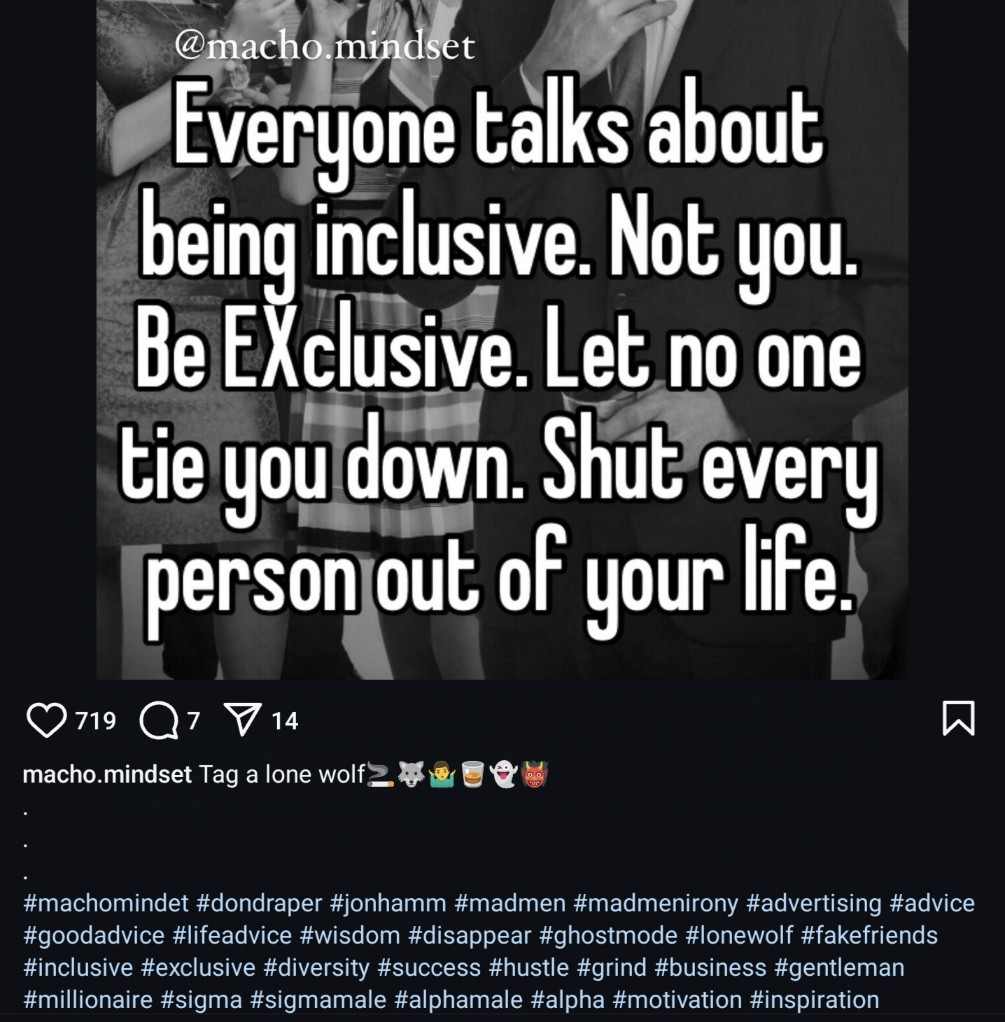Imagine a secret code that’s only known by the most independent, mysterious, and self-reliant people out there. This is what “Sigma Slang” is all about—words and phrases that belong to the world of Sigma males. These individuals prefer to walk their own path, away from the spotlight, while quietly standing out with their unique, no-nonsense attitude.
Now, here’s the twist—this slang isn’t just for them anymore. It’s catching fire on social media, in memes, and even in everyday conversations. Why? Because the Sigma mindset—the idea of being a “lone wolf” who doesn’t need to follow anyone—resonates with a lot of people, especially those who like to stay independent and rebellious.
And let’s be honest—doesn’t learning a secret language sound a little exciting? Dive in, and you’ll not only understand Sigma slang but might even discover a whole new way of seeing the world.

Understanding the Sigma Male Archetype: The Backbone of Sigma Slang
Before we decode Sigma slang, let’s talk about the Sigma male. Who is he? Think of someone who doesn’t crave attention, avoids drama, and doesn’t need a crowd to feel complete. He’s the opposite of an Alpha male, who loves being in charge and leading the pack. Instead, the Sigma male works in silence, stays in control of his own life, and focuses on his goals without seeking approval from others.
But don’t mistake his quiet nature for weakness. Sigma males are confident, strategic, and often more influential than they seem. They don’t shout their power; they show it subtly through actions. This personality type is what shapes Sigma slang—it’s all about independence, intellect, and rebellion against conventional rules.
This archetype has become a modern symbol for people who don’t want to fit into a box. And the slang? It’s their way of speaking a language that reflects their cool, understated confidence.
What Is Sigma Slang? Breaking Down the Concept
So, what exactly is Sigma slang? It’s a set of words and phrases that perfectly capture the mindset of the Sigma male. For example, terms like “lone wolf” or “silent operator” highlight independence and staying under the radar. It’s the language of people who value their freedom and don’t need others to validate them.
Sigma slang doesn’t sound flashy or loud. Instead, it’s simple, direct, and powerful—just like the Sigma male himself. It’s also a way to challenge societal norms and say, “Hey, I don’t need to do things your way. I’ve got my own style.”
Related Post: The Ultimate Guide to the Sigma Male Grindset: Traits, Habits, and Success Secrets
And where did it come from? Social media and online forums are its breeding ground. Over time, these terms spread like wildfire, turning into a cultural phenomenon. Now, it’s not just Sigma males using this slang—it’s anyone who finds the idea of being independent and self-sufficient appealing.
By learning Sigma slang, you’re not just picking up cool new words. You’re stepping into a world where independence is the ultimate power move. So, ready to start? Let’s go deeper.
Core Elements of Sigma Slang: Words, Phrases, and Their Meanings
Let’s crack open the mysterious code of Sigma slang. It’s not just random words—it’s a collection of cool, clever terms that reflect a mindset of independence, calm power, and subtle rebellion. Think of it as the secret language of people who prefer to stay in the shadows yet still have a big impact.
One of the most popular phrases is “Lone Wolf.” This means someone who doesn’t need a pack to survive. They’re confident enough to walk their own path, even if no one else is following. It’s not about being lonely—it’s about being free.
Then there’s “Silent Operator.” This term describes someone who works quietly but efficiently. They don’t make a big fuss about their plans; they just get things done, leaving everyone else wondering, “How did they pull that off?”
Another common term is “Ghost Mode.” This is when a Sigma disappears from social scenes, avoids unnecessary chatter, and focuses entirely on their own goals. It’s like hitting the pause button on outside distractions to tune into what truly matters.
Each phrase isn’t just a word—it’s a badge of honor for anyone who values independence and doesn’t feel the need to shout about their success. Ready to add these to your vocabulary? Let’s keep going.
List of Some Popular Sigma Slangs with Their Meanings
1. Lone Wolf – Someone who thrives on their own without needing a group or “pack.”
2. Ghost Mode – Disappearing from social scenes or distractions to focus entirely on personal goals.
3. Silent Operator – A person who works quietly but gets things done without drawing attention.
4. Shadow Leader – Someone who leads from behind the scenes without seeking the spotlight.
5. High-Value Isolation – Choosing solitude to enhance personal growth or focus on important goals.
6. Rules Don’t Apply – Living life on your own terms, ignoring societal or traditional expectations.
7. Alpha in Disguise – Displaying alpha-like confidence and success without needing validation or dominance.
8. No Herd Needed – Emphasizing self-reliance and individuality over group conformity.
9. Detachment Mode – Staying emotionally distant to protect energy and maintain focus.
10. Calculated Freedom – Making intentional, well-thought-out decisions to live life freely.
11. Unfollow the Leader – Refusing to follow trends or popular opinions, forging your own path instead.
12. Minimal Impact, Maximum Effect – Doing more with less effort and maintaining efficiency in everything.
13. Lone Hustle – Building success independently without relying on others for help or approval.
14. Invisible Influence – Quietly affecting outcomes or situations without taking credit or being noticed.
15. Maverick Mentality – Thinking and acting independently, often in ways that challenge conventional norms.
Related Post: Top 12 Sigma Male Celebrities: Discover The Power Of Strength & Independence
How Sigma Slang Reflects the Lone Wolf Mentality
At its core, Sigma slang mirrors the mindset of a lone wolf—a person who doesn’t follow the crowd but leads themselves. Every word in this slang is like a piece of the puzzle that makes up the Sigma personality.
Take the term “Shadow Leader.” It reflects how Sigma males influence others without being in the spotlight. They lead from behind the scenes, quietly steering situations their way.
Or consider “No Herd Needed.” This one sums up the Sigma belief that you don’t need a group to define your identity. It’s about staying true to yourself, no matter what the crowd is doing.
These phrases aren’t just catchy—they’re empowering. They remind you that it’s okay to stand alone, to choose freedom over conformity. Sigma slang isn’t about being loud; it’s about being powerful in your own unique, quiet way. And that’s what makes it so magnetic.
The Evolution of Sigma Slang: From Online Forums to Mainstream Culture
Now, here’s a fun fact: Sigma slang didn’t just appear out of nowhere. It started in the corners of the internet—places like Reddit, forums, and online communities where people discussed independence and self-reliance. These discussions gave birth to a unique vocabulary that resonated with Sigma-minded individuals.
At first, it was like a secret club. Only a small group of people understood terms like “High-Value Isolation” or “Rules Don’t Apply.” But as these ideas spread, more people began to connect with them. Social media took over, with memes, videos, and tweets turning Sigma slang into a cultural trend.
Related Post: 10 Sigma Male Rules That’ll Transform You into a High Value Man
Soon, mainstream culture caught on. Influencers, podcasters, and even casual social media users started using Sigma slang to describe their own lives. It wasn’t just about being a Sigma male anymore—it was about embracing the idea of individuality and freedom.
Today, Sigma slang has evolved into something bigger. It’s not just for one personality type—it’s for anyone who wants to live life on their own terms. And isn’t that what makes it so irresistible?
Sigma Slang in Action: Examples of Usage Across Social Platforms
Have you ever scrolled through social media and seen someone call themselves a “Lone Wolf” or say they’re going into “Ghost Mode”? That’s Sigma slang in action. These words aren’t just phrases—they’re power moves, showing the world that the person values their independence and doesn’t need approval from anyone.
On platforms like TikTok, people post videos about their “Sigma mindset,” using hashtags like #SigmaMale or #LoneWolf. They talk about staying focused on their goals, cutting out distractions, and embracing a life that doesn’t follow anyone else’s rules. It’s not just a trend—it’s a vibe.


Memes are another playground for Sigma slang. You might see a picture of someone standing apart from a crowd with the caption: “When you’re thriving in Ghost Mode.” It’s funny, relatable, and speaks to a growing desire for independence.

Even on Twitter, you’ll find threads where users drop phrases like “Silent Operator” to describe how they quietly handle their business without making a big scene. It’s like a subtle way of saying, “I’m doing things my way, and I don’t need to broadcast it.”
Whether it’s a meme, a TikTok sound, or a short tweet, Sigma slang is everywhere. And it’s not just about using the words—it’s about living the mindset.
How to Use Sigma Slang Effectively Without Sounding Forced
Using Sigma slang is like wearing a leather jacket—it’s cool, but only if you do it right. The key? Keep it natural.
Start by understanding what the terms mean and how they’re used. For example, if you say “I’m going into Ghost Mode,” make sure it fits the situation. Maybe you’re taking a break from social media to focus on yourself—that’s the perfect time to use it.
Another tip? Don’t overdo it. Using Sigma slang every other sentence can make you sound like you’re trying too hard. Instead, sprinkle it into conversations where it feels relevant. For instance, if a friend is dealing with drama and you’ve chosen to stay out of it, you could say, “I’m sticking to my Lone Wolf strategy.”
It’s also important to match the tone. Sigma slang is cool, calm, and collected—not loud or attention-seeking. So, keep your delivery subtle, just like the Sigma mindset itself.
When used right, Sigma slang can make you stand out as someone who values their independence. Misuse it, and it’ll just sound like you’re hopping on a trend.
Criticism and Misuse of Sigma Slang: Addressing the Controversy
Like anything popular, Sigma slang has its fair share of criticism. Some people argue that it’s just a way to sound cool while avoiding real connections. Others say it’s been misused to promote toxic masculinity or anti-social behavior.
For example, someone might misuse the term “Lone Wolf” to justify isolating themselves in unhealthy ways. Or they might call themselves a “Silent Operator” but use it as an excuse to avoid accountability. This isn’t what Sigma slang is really about—it’s meant to empower, not excuse bad behavior.
Critics also point out that some people use Sigma slang to feel superior to others. This goes against the true Sigma mindset, which is about quiet confidence, not arrogance.
By understanding the real meaning of Sigma slang, you can use it in a way that stays true to its roots. Remember, it’s not about creating distance or putting others down—it’s about embracing your independence and staying authentic.
Is Sigma Slang Just a Fad or a Lasting Cultural Shift?
So, is Sigma slang here to stay, or will it fade away like last year’s viral dance challenge? The answer might surprise you.
Sigma slang taps into something timeless: the desire for independence and freedom. People have always admired the idea of a lone wolf, someone who doesn’t follow the crowd but still succeeds in their own way. This is why Sigma slang resonates so deeply—it reflects values that aren’t going out of style anytime soon.
That said, the specific terms might evolve. Words like “Ghost Mode” or “Silent Operator” could be replaced with new ones, but the core message will remain the same. As long as people value self-reliance, Sigma slang—or some version of it—will likely stick around.
In many ways, it’s not just a fad; it’s a reflection of a larger cultural shift toward individuality and breaking away from traditional norms.
Conclusion: What Sigma Slang Reveals About Modern Individualism
At the heart of Sigma slang is a powerful idea: you don’t need to follow the crowd to succeed. It celebrates independence, quiet confidence, and living life on your terms.
In a world that often pressures people to fit in, Sigma slang offers an alternative. It says, “It’s okay to stand alone. It’s okay to focus on yourself.” This message is why so many people connect with it—it’s not just words; it’s a mindset.
Whether you’re using Sigma slang to describe your goals, your lifestyle, or just to have some fun, remember what it truly represents: the freedom to be unapologetically you. And that? That’s something worth holding onto, long after the hashtags fade.
Image Source: Freepik & Instagram